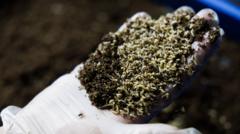Can Flies Help Us Reduce Food Waste?

Embracing Maggots: The Innovative Approach to Food Waste Management
In an age where sustainable practices are gaining momentum, the use of maggots, or fly larvae, in waste management has emerged as an innovative solution to a growing global problem: food waste. While many people instinctively shoo flies away from their food, a handful of city councils have embraced the larvae’s incredible appetite for decomposing organic matter. This article explores the unique case of Vilnius, Lithuania, where fly larvae are not only processing food waste but also generating new business opportunities. We will delve into how this model could inspire other cities around the world, including the UK, to rethink their waste management strategies.
The Growing Challenge of Food Waste
Food waste is a pressing issue globally. According to the Food and Agriculture Organization (FAO), approximately 1.3 billion tonnes of food is wasted annually, contributing significantly to greenhouse gas emissions and the depletion of natural resources. In urban areas, the challenge is magnified as the population continues to rise, leading to increased household waste. Cities must find innovative solutions to manage this waste sustainably.
Understanding the Scale of the Problem
In Vilnius, the capital of Lithuania, the challenge is clear. The city’s 607,000 residents produce around 40,000 tonnes of household waste each year. Of this, approximately 2,700 tonnes is food waste that requires effective processing. As part of a broader European initiative to improve waste management, the city has implemented mandatory food waste collection, prompting the need for innovative solutions.
How Fly Larvae Are Transforming Waste Management in Vilnius
Energesman, the waste management company in Vilnius, has taken an unconventional approach to the food waste crisis. By utilizing fly larvae, they are turning a potential environmental hazard into a sustainable business model. The process involves collecting food waste and feeding it to specially bred fly larvae.
The Economic Benefits of Using Fly Larvae
One of the most compelling aspects of this initiative is its economic viability. Energesman does not charge the city for processing the food waste, which is projected to save Vilnius up to €2 million ($2.3 million) annually. This cost-saving model is achieved through the strategic use of larvae, which can consume large quantities of organic waste efficiently.
Efficient Waste Processing
Fly larvae have an insatiable appetite for decomposing organic matter. In their early life stages, they are capable of consuming over 11 tonnes of food waste in just a few days. This incredible efficiency makes them ideal candidates for waste processing. The key to success lies in harvesting the larvae before they mature into flies, maximizing the amount of organic waste they can process.
From Waste to Resource: The Potential of Fly Larvae
Beyond just processing food waste, the larvae can be transformed into valuable resources. The protein-rich larvae can be used in animal feed, while their frass (larvae manure) serves as an excellent organic fertilizer. This dual benefit adds an additional layer of sustainability to the process, aligning with the circular economy principles that are becoming increasingly important.
Innovative Product Development
Energesman is exploring various avenues for monetizing the larvae-derived products. They have initiated trials with partners in industries such as paint, glue, and furniture. While some initial results have been mixed, the potential for creating sustainable products from fly larvae is promising. For instance, though the sample paint didn't meet color standards, the lamp shades produced show great potential.
Learning from Global Models
While Vilnius has taken a pioneering step, they are not alone in this journey. Cities around the globe are beginning to recognize the value of fly larvae in waste management. For instance, Goterra in Australia has been actively using fly larvae in Sydney to manage food waste effectively. Similarly, Project Mila in Kenya uses larvae to address food waste while providing organic fertilizer to local farmers.
The UK Landscape: Potential for Change
In the UK, food waste management is a significant issue, with approximately 6.4 million tonnes of household food waste generated each year. Despite the challenges posed by regulations, there is a growing interest among local councils to explore the use of fly larvae for waste processing. Larry Kotch, CEO of Flybox, highlights the potential for insect waste management to become a reality in the UK, especially with the upcoming mandatory weekly household food waste collections set for 2026.
Regulatory Hurdles and Future Prospects
Despite the promising potential of using fly larvae in waste management, regulatory barriers currently limit their application in the UK. The Animal By-Product Regulations restrict the use of insects for processing organic waste streams, which poses challenges for councils looking to adopt this innovative approach. However, there is hope that as more cities around the world successfully implement these systems, regulatory changes may follow in time to allow for greater flexibility.
The Importance of Advocacy and Awareness
For the adoption of fly larvae in waste processing to gain traction, advocacy and public awareness are crucial. Education campaigns, similar to those rolled out in Vilnius, could help residents understand the benefits of separating food waste and utilizing larvae for processing. As the concept becomes more normalized, city councils may feel more confident in exploring these innovative solutions.
Conclusion: A Sustainable Future Awaits
The innovative use of fly larvae in food waste management presents a compelling case for cities worldwide. With the dual benefits of efficient waste processing and the creation of valuable by-products, this approach aligns seamlessly with sustainable practices and the circular economy. As we move toward a future where food waste is minimized and resources are maximized, the time may be ripe for more cities to embrace this unconventional yet effective solution.
As we continue to grapple with the challenges of waste management, how far are we willing to go to innovate and embrace unconventional solutions? The potential of fly larvae in waste processing may just be the key to a more sustainable future.
FAQs About Using Fly Larvae in Food Waste Management
What are fly larvae, and how do they help with food waste management?
Fly larvae, commonly known as maggots, are the immature stage of flies. They are effective in food waste management due to their ability to consume large amounts of organic waste quickly. This process not only reduces the volume of waste but also converts it into protein-rich larvae and organic fertilizer.
What are the economic benefits of using fly larvae for waste management?
The economic benefits include significant cost savings for municipalities, as seen in Vilnius, where the use of fly larvae is projected to save the city millions annually. Additionally, the by-products generated from larvae can be sold, creating new revenue streams.
Are there any regulations regarding the use of fly larvae in food waste management?
Yes, regulations such as the Animal By-Product Regulations in the UK currently restrict the use of insects for processing organic waste. These regulations are aimed at ensuring biosecurity and reducing disease risk, but they may change as more successful models emerge globally.
What other industries can benefit from fly larvae products?
Fly larvae can be utilized in various industries, including animal feed, organic fertilizers, and even manufacturing products like paint and glue. Their ability to convert waste into valuable resources makes them a versatile option for multiple sectors.
As cities like Vilnius pave the way for sustainable waste management solutions, will we see a global shift towards adopting innovative methods like fly larvae processing? The potential remains vast. #SustainableWasteManagement #FlyLarvae #InnovativeSolutions
Published: 2025-06-26 23:13:11 | Category: technology



